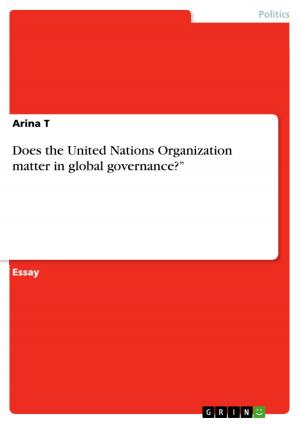CharlesTaylor - 'The Politics of Recognition' and Intercultural Tensions
'The Politics of Recognition' and its representation in Israel Zangwill's 'The Melting Pot' and Amiri Baraka's 'Dutchman'
Fiction & Literature, Literary Theory & Criticism, British| Author: | Oliver Christl | ISBN: | 9783640495795 |
| Publisher: | GRIN Publishing | Publication: | December 17, 2009 |
| Imprint: | GRIN Publishing | Language: | English |
| Author: | Oliver Christl |
| ISBN: | 9783640495795 |
| Publisher: | GRIN Publishing |
| Publication: | December 17, 2009 |
| Imprint: | GRIN Publishing |
| Language: | English |
Seminar paper from the year 2007 in the subject English - Literature, Works, grade: 1, 0, University of Würzburg, language: English, abstract: Tensions between minority groups and the all-embracing liberal tradition of Western society have been on the agenda of the debate over multiculturalism for decades, occupying the minds of both political thinkers and authors. The contribution the Canadian philosopher Charles Taylor has made to explain the increasing demand of cultural and other groups for recognition in our liberal societies has immensely influenced today's multicultural debate. With his general approach to the concept of recognition Taylor has found widespread resonance. This paper investigates the issue of intercultural tensions as it is portrayed in Charles Taylor's essay 'The Politics of Recognition' and its representation in Israel Zangwill's The Melting Pot and Amiri Baraka's Dutchman. In order to achieve an overall understanding of Taylor's approach to the issue the investigation first focuses on his essay's fundamental statements and then on its main arguments concerning liberalism and cultural difference. The discussion includes comments and critique on Taylor's essay, mainly taken from the volume Multiculturalism: Examining the Politics of Recognition edited by Amy Gutmann, which also contains Taylor's essay. On the basis of Taylor's ideas the representation of intercultural tensions in The Melting Pot and Dutchman is described in the following with a focus on cultural identity, the arts and cultural assimilation. In his highly influential essay 'The Politics of Recognition' Charles Taylor approaches the issue of multiculturalism from a philosophical perspective. In order to explain the increasing demand for public recognition put forward by different groups and individuals in contemporary multicultural societies, Taylor's investigation focuses on the relationship between the identity of an individual or a group and its recognition within its social background. In the public sphere, he argues, there is a demand for equal recognition based on the modern notion of dignity. This concept, 'used in a universalist and egalitarian sense' has arisen in modern democracy since the collapse of social hierarchies and 'has taken various forms over the years, and has now returned in the form of demands for the equal status of cultures and genders' (Taylor 76f.). Also linked with the decline of hierarchical society, according to Taylor, a development in the inner sphere of the individual has taken place:
Seminar paper from the year 2007 in the subject English - Literature, Works, grade: 1, 0, University of Würzburg, language: English, abstract: Tensions between minority groups and the all-embracing liberal tradition of Western society have been on the agenda of the debate over multiculturalism for decades, occupying the minds of both political thinkers and authors. The contribution the Canadian philosopher Charles Taylor has made to explain the increasing demand of cultural and other groups for recognition in our liberal societies has immensely influenced today's multicultural debate. With his general approach to the concept of recognition Taylor has found widespread resonance. This paper investigates the issue of intercultural tensions as it is portrayed in Charles Taylor's essay 'The Politics of Recognition' and its representation in Israel Zangwill's The Melting Pot and Amiri Baraka's Dutchman. In order to achieve an overall understanding of Taylor's approach to the issue the investigation first focuses on his essay's fundamental statements and then on its main arguments concerning liberalism and cultural difference. The discussion includes comments and critique on Taylor's essay, mainly taken from the volume Multiculturalism: Examining the Politics of Recognition edited by Amy Gutmann, which also contains Taylor's essay. On the basis of Taylor's ideas the representation of intercultural tensions in The Melting Pot and Dutchman is described in the following with a focus on cultural identity, the arts and cultural assimilation. In his highly influential essay 'The Politics of Recognition' Charles Taylor approaches the issue of multiculturalism from a philosophical perspective. In order to explain the increasing demand for public recognition put forward by different groups and individuals in contemporary multicultural societies, Taylor's investigation focuses on the relationship between the identity of an individual or a group and its recognition within its social background. In the public sphere, he argues, there is a demand for equal recognition based on the modern notion of dignity. This concept, 'used in a universalist and egalitarian sense' has arisen in modern democracy since the collapse of social hierarchies and 'has taken various forms over the years, and has now returned in the form of demands for the equal status of cultures and genders' (Taylor 76f.). Also linked with the decline of hierarchical society, according to Taylor, a development in the inner sphere of the individual has taken place:















